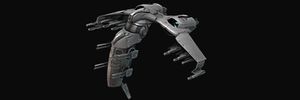Vehicle Aero Locust
| Locust | |
|---|---|
 Locust | |
| Type | Aerocraft |
| Combat role | Aerocraft |
| Service | |
| Used by | Antarean Imperial Army |
| Wars | Second Antarean War |
| Production | |
| Manufacturer | KMD |
| Score requirement | 150 points |
| Specifications | |
| Length | 5m |
| Mod slots |
1x Main Weapon 1x Missile 2x Chassis 2x Utility 1x Countermeasure |
| Statistics | |
| Hull | 2500 points |
| Armour | 1000 points |
| Boost time | 10s |
| Max speed | 2040 |
Slower but more maneuverable than the ULA counterpart, it has four plasma cannons to harass the enemy with, and the body these guns are attached to is very maneuverable. possibly more deadly in the right hands. As opposed to the Sturm, the Locust does not come with a gunner seat and instead uses a computerized FCS (Fire Control System) to augment the pilot's abilities. AIA Locust pilots are specially trained and augmented to resist the high G's associated with the Locust's maneuvers, as they also lay on their stomach inside the craft.
The Locust has two flight modes that drastically change how the aircraft operates, a hover mode and a flight mode. The entire assembly underneath the aircraft and the thrust nozzles rotate downwards when in hover mode, giving it the signature T-shaped profile. This is generally better suited to firing on ground targets with rockets or the plasma cannons, even though the damage is less concentrated on a single point. Operators are advised not to do daring maneuvers while in this mode, lest the craft crash into structures or trees, forcing the pilot to bail. The flight mode tucks the assembly in and redirects the nozzles, which drastically alters the Locust's visual profile, making it better suited to dogfighting the Sturm or escaping fire and flying low.
Operators are advised to look for the red targeting laser given off by the RID employed by ULA troops. Flight manual suggests prioritizing the greatest infantry threats first with cannons or bomblets. If encountering multiple RID-wielding opponents, it is suggested to find a more suitable attack angle to minimize exposure and danger.
| ||||||||||||||